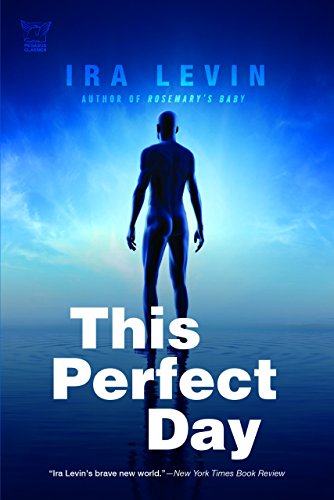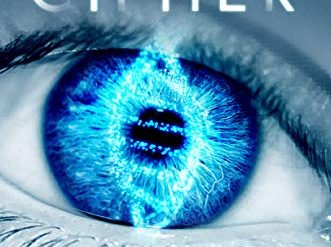
Centuries in the future, the people of Earth live under the control of an artificial intelligence called UniComp. A century and a half earlier, the computers governing the five continents had come together in the Unification. The result was a worldwide society free of war, hunger, crime, and violence of any sort. “Hate” and “fight” are swear words. This is the world Ira Levin describes in his superb science fiction novel, This Perfect Day.
The world run by Unicomp is dedicated to efficiency above all else. The population of the planet is kept steady at eight billion through rigorous control of the birth rate and through emigration to colonies the Family has established on Mars, Venus, and the moons of Saturn and Jupiter, as well as on several extrasolar planets. It’s inefficient to grow and prepare a variety of foods, so everyone’s nutritional needs are met through an unchanging diet of totalcakes. To suppress undesirable behavior, everyone submits monthly to chemotherapy treatments; otherwise, they will get “sick” and demonstrate aberrant behavior.
A world where artificial intelligence rules
Genetic engineers are laboring to ensure that each new generation contains as few distinguishing physical characteristics as possible. “Hair the same, eyes the same, skin the same, shape the same; boys, girls, all the same. Like peas in a pod.” Conditioning through treatments suppresses the growth of facial hair on men and breasts on women as well as women’s ability “to have too many babies.” Individuals who possess unique characteristics, such as white skin or one green eye, are prone to feel guilty about their misfortune. They all live to the age of 62. Then they die. Everyone has an advisor who will guide them to early treatment, if necessary. The people sing, “One mighty Family, A single perfect breed, Free of all selfishness, Aggressiveness and greed; Each member giving all he has to give And getting all he needs to live!”
This Perfect Day by Ira Levin (1970) 320 pages ★★★★★
Four prophets: Christ, Marx, Wood, and Wei
Individuals are called members of the Family. There are just four male and four female given names. Everyone wears identical coveralls. Each individual has a nameber, a long alphanumeric code that UniComp can use to track their movements as they touch the bracelets they all wear to scanners wherever they go. Cities are identified by three-digit abbreviations—Usa, Rus, Ind, Chi, and so forth—followed by a five-digit numerical zip code. The Family’s belief system recognizes four prophets: Christ, Marx, Wood, and Wei. Their names are often invoked to express concern or amazement. Wednesday is now Woodsday. March has become the month of Marx.
Into the bowels of Unicomp in this prescient novel about artificial intelligence
This Perfect Day opens in 145 Y.U. and draws to a close in 172. The protagonist, who calls himself Chip, is LiRM35MM4419. He is Li to those who don’t know him well. At age 10, Chip is granted permission to travel with his parents, his sister, and his grandfather to EUR00001 (somewhere in the Jura Mountains on what was once called the Swiss-French border).
The trip is Chip’s opportunity to visit UniComp, a pilgrimage that every member of the Family is expected to take at least once in a lifetime. There he learns that his grandfather, Papa Jan, had been involved in the construction of UniComp: he had come up with the idea of constructing a secret tunnel through which UniComp’s memory banks could be driven deep under the surface of the Earth. Papa Jan even manages to bypass the scanners and take Chip deep underground to see the ranks of UniComp’s memory banks.
The incurables in isolated communities
As a child, Chip hears rumors about the incurables who live in isolated communities somewhere on Earth. He is assured that such people no longer exist. But a seed of doubt and curiosity has been planted. Later, once Chip has completed technical training, he is assigned as a genetic taxonomist, fourth class, to a succession of jobs at locations scattered about the planet. At one posting, he rooms with a secretive individual named Karl who demonstrates artistic talent and goes to great lengths to obtain notebooks he can draw in. Chip’s first act of rebellion is to secure notebooks Karl is unable to obtain because he can’t receive permission from UniComp. When Chip asks his current girlfriend “which [job classification] you would pick if you had to pick one,” she is first confused, then incredulous. “That’s silly,” she tells him. “And sick. We get classified; there’s nothing to think about.”
Why can’t he make choices for himself?
As the years go by, Chip continues to wonder why he can’t make choices for himself, and his curiosity about the incurables grows. “Everything came to seem questionable to him: totalcakes, coveralls, the sameness of members’ rooms and thoughts, and especially the work he was doing, whose end, he saw, would only be to solidify the universal sameness.”
When he is recruited into a small group of nonconformists—they express their rejection of society’s norms by smoking tobacco and by pairing off with partners they themselves choose—Chip finds an ally and sets off to research the truth about the incurables. The others in the group show Chip how to first reduce, then eliminate the monthly treatments. At length, he finds proof that there are islands all over the world (Madagascar, Cuba, the Andamans, Majorca, and many others) that have been suppressed from the maps. He is convinced that the incurables live there. Eventually, he comes fully alive and makes his way to Majorca.
On the island, Chip discovers that he has left a comfortable existence for poverty and endless drudgery on what is essentially a prison colony—intentionally allowed by UniComp. He is resolved to put an end to the computer’s oppression. After months of searching, Chip finds five other members who will join him on a dangerous excursion to the mainland of Eur and make their way to the mountains, where they can plant explosives to destroy UniComp.
A small community of programmers
At long last Chip locates the secret tunnel Papa Jan had told him about 27 years earlier and enters the domain of UniComp with two companions. They are shocked to discover that the facility houses a small community of programmers who live in luxury and are catered to by slavish young servants 24 hours a day. Most of the programmers are migrants from the Family, just like him. (Contrary to what everyone outside believes, UniComp makes no decisions on its own.) Disgusted by this revolting display of privilege, Chip bides his time until an opportunity presents himself to detonate bombs delivered by a new crew of would-be saboteurs. At last, his mission succeeds. He is free to return to his home in Africa, where he left behind a wife and child. At last, humanity triumphs over artificial intelligence.
About the author
Ira Levin, an American screenwriter and novelist, was the author of A Kiss Before Dying, Rosemary’s Baby, The Stepford Wives, The Boys from Brazil, and other bestselling books that were adapted into successful Hollywood films. Levin was a versatile writer, creating bestselling mysteries, horror, and science fiction.
For related reading
This is one of Two dozen good books about artificial intelligence, and it’s included in 20 good nonfiction books about the future (plus lots of science fiction).
For more good reading, check out:
- These novels won both Hugo and Nebula Awards
- The ultimate guide to the all-time best science fiction novels
- 10 top science fiction novels
- The top 10 dystopian novels
- 10 new science fiction authors worth reading now
And you can always find my most popular reviews, and the most recent ones, on the Home Page.


























